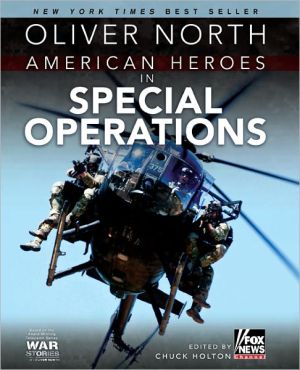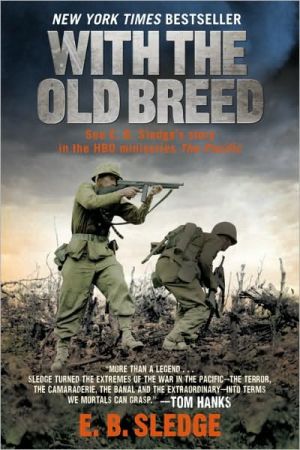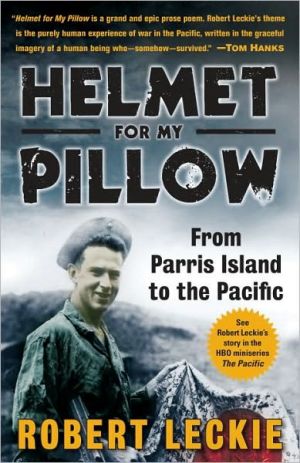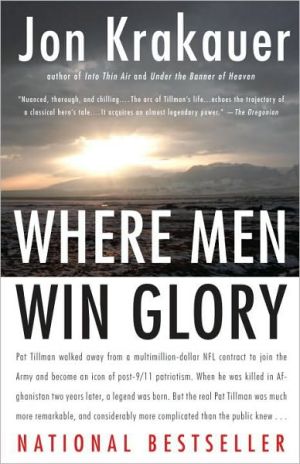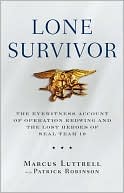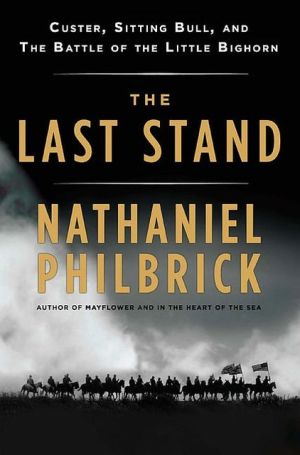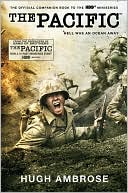One Bullet Away: The Making of a Marine Officer
If the Marines are “the few, the proud,” Recon Marines are the fewest and the proudest. Nathaniel Fick’s career begins with a hellish summer at Quantico, after his junior year at Dartmouth. He leads a platoon in Afghanistan just after 9/11 and advances to the pinnacle—Recon—two years later, on the eve of war with Iraq. His vast skill set puts him in front of the front lines, leading twenty-two Marines into the deadliest conflict since Vietnam. He vows to bring all his men home safely, and to...
Search in google:
A former captain in the Marines First Recon Battalion, who fought in Afghanistan and Iraq, reveals how the Corps trains its elite and offers a point-blank account of twenty-first-century battle. If the Marines are the few, the proud, Recon Marines are the fewest and the proudest. Only one Marine in a hundred qualifies for Recon, charged with working clandestinely, often behind enemy lines. Fick s training begins with a hellish summer at Quantico, after his junior year at Dartmouth, and advances to the pinnacle -- Recon -- four years later, on the eve of war with Iraq. Along the way, he learns to shoot a man a mile away, stays awake for seventy-two hours straight, endures interrogation and torture at the secretive SERE course, learns to swim with Navy SEALs, masters the Eleven Principles of Leadership, and much more. His vast skill set puts him in front of the front lines, leading twenty-two Marines into the deadliest conflict since Vietnam. He vows he will bring all his men home safely, and to do so he ll need more than his top-flight education. He ll need luck and an increasingly clear vision of the limitations of his superiors and the missions they assign him. Fick unveils the process that makes Marine officers such legendary leaders and shares his hard-won insights into the differences between the military ideals he learned and military practice, which can mock those ideals. One Bullet Away never shrinks from blunt truths, but it is an ultimately inspiring account of mastering the art of war. Publishers Weekly The global war on terrorism has spawned some excellent combat narratives-mostly by journalists. Warriors, like Marine Corps officer Fick, bring a different and essential perspective to the story. A classics major at Dartmouth, Fick joined the Marines in 1998 because he "wanted to go on a great adventure... to do something so hard that no one could ever talk shit to me." Thus begins his odyssey through the grueling regimen of Marine training and wartime deployments-an odyssey that he recounts in vivid detail in this candid and fast-paced memoir. Fick was first deployed to Afghanistan, where he saw little combat, but his Operation Freedom unit, the elite 1st Reconnaissance Battalion, helped spearhead the invasion of Iraq and "battled through every town on Highway 7" from Nasiriyah to al Kut. (Rolling Stone writer Evan Wright's provocative Generation Kill is based on his travels with Fick's unit.) Like the best combat memoirs, Fick's focuses on the men doing the fighting and avoids hyperbole and sensationalism. He does not shrink from the truth-however personal or unpleasant. "I was aware enough," he admits after a firefight, "to be concerned that I was starting to enjoy it." Agent, E.J. McCarthy. (Oct.) Copyright 2005 Reed Business Information.
1\ Fifteen of us climbed aboard the ancient white school bus. Wire mesh covered its windows and four black words ran along its sides: UNITED STATES MARINE CORPS.\ Dressed casually in shorts and sandals, we spread out and sat alone with our bags. Some sipped coffee from paper cups, and a few unfolded newspapers they had brought. I found a seat near the back as the bus started with a roar and a cloud of smoke blew through the open windows.\ A second lieutenant, looking crisp in his gabardine and khaki uniform, sat in the front row. He had just graduated from Officer Candidates School, and would escort us on the hour’s drive to the Marine Corps base in Quantico, Virginia. Shortly after we pulled away from the recruiting office, he stood in the aisle and turned to face us. I expected a welcome, a joke, some commiseration.\ “Honor, courage, and commitment are the Marines’ core values,” the lieutenant shouted over the engine.\ He sounded scripted, but also sincere. “If you can’t be honest at OCS, how can the Corps trust you to lead men in combat?” Combat. I glanced around the bus’s gunmetal interior, surprised to see people reading or pretending to sleep. No one answered the lieutenant’s question. He stood there in the aisle, glaring at us, and I sat up a little straighter. The lieutenant was my age, but he looked different. Shorter hair, of course, and broader shoulders. It was more than that. He had an edge, something in his jaw or his brow that made me self-conscious.\ I turned toward the window to avoid his gaze. Families drove next to us, on their way to the lake or the beach. Kids wearing headphones gawked, surely wondering what losers were riding a school bus in the summertime. A girl in an open Jeep stood and started to raise her shirt before being pulled back down by a laughing friend. They waved and accelerated past. I thought of my friends, spending their summer vacations in New York and San Francisco, working in air-conditioned office towers and partying at night. Staring through the wire mesh at the bright day, I thought this must be what it’s like on the ride to Sing Sing. I wondered why I was on that bus.\ I went to Dartmouth intending to go to med school. Failing a chemistry class had inspired my love of history, and I ended up majoring in the classics. By the summer of 1998, my classmates were signing six-figure contracts as consultants and investment bankers. I didn’t understand what we, at age twenty-two, could possibly be consulted about. Others headed off to law school or medical school for a few more years of reading instead of living. None of it appealed to me. I wanted to go on a great adventure, to prove myself, to serve my country. I wanted to do something so hard that no one could ever talk shit to me. In Athens or Sparta, my decision would have been easy. I felt as if I had been born too late. There was no longer a place in the world for a young man who wanted to wear armor and slay dragons.\ Dartmouth encouraged deviation from the trampled path, but only to join organizations like the Peace Corps or Teach for America. I wanted something more transformative. Something that might kill me—or leave me better, stronger, more capable. I wanted to be a warrior.\ My family had only a short martial tradition. My maternal grandfather, like many in his generation, had served in World War II.\ He was a Navy officer in the South Pacific, and his ship, the escort carrier Natoma Bay, fought at New Guinea, Leyte Gulf, Iwo Jima, and Okinawa, often supporting Marine invasion forces ashore. At 0635 on June 7, 1945, so the family story went, only two months before the end of the war, a Japanese kamikaze crashed into the Natoma Bay’s flight deck. The explosion tore a hole in the steel twelve feet wide and twenty feet long. Shrapnel peppered my grandfather’s body. My mother remembers watching him pick pieces of metal from his skin twenty years later. He had some of that shrapnel melted into a lucky horseshoe, which was shown to me with great reverence when I was a child.\ My father enlisted in the Army in 1968.\ When most of his basic training class went to Vietnam, he received orders to the Army Security Agency. He spent a year in Bad Aibling, Germany, eavesdropping on Eastern bloc radio transmissions and waiting for the Soviets to roll through the Fulda Gap. He completed OCS just as President Richard Nixon began drawing down the military, and took advantage of an early out to go to law school. But my dad was proud to have been a soldier.\ The Army sent me a leetter during my junior year at Dartmouth, promising to pay for graduate school.\ The Navy and Air Force did the same, promising skills and special training.\ The Marine Corps promised nothing. Whereas the other services listed their benefits, the Corps askeeeeed, “Do you have what it takes?” If I was going to serve in the military, I would be a Marine.\ A few months before, I’d seen a poster in the dining hall advertising a talk by Tom Ricks. Then the Wall Street Journal’s Pentagon correspondent, Ricks had recently written a book about the Marines. I sat up most of one night reading it. I arrived early to get a good seat and listened as Ricks explained the Corps’s culture and the state of civil-military relations in the United States. His review of the Marines, or at least my interpretation of it, was glowing. The Marine Corps was a last bastion of honor in society, a place where young Americans learned to work as a team, to trust one another and themselves, and to sacrifice for a principle. Hearing it from a recruiter, I would have been skeptical.\ But here was a journalist, an impartial observer.\ The crowd was the usual mix of students, faculty, and retired alumni. After the talk, a young professor stood. “How can you support the presence of ROTC at a place like Dartmouth?” she asked. “It will militarize the campus and threaten our culture of tolerance.” “Wrong,” replied Ricks. “It will liberalize the military.” He explained that in a democracy, the military should be representative of the people. It should reflect the best of American society, not stand apart from it. Ricks used words such as “duty” and “honor” without cynicism, something I’d not often heard at Dartmouth.\ His answer clinched my decision to apply for a slot at Marine OCS during the summer between my junior and senior years of college. I would have laughed at the idea of joining the Corps on a bet or because of a movie, but my own choice was almost equally capricious. Although I had reached the decision largely on my own, Tom Ricks, in an hour-long talk on a cold night at Dartmouth, finally convinced me to be a Marine.\ But even joining the Marines didn’t seem as crazy as it had to my parents’ generation. This was 1998, not 1968. The United States was cashing in its postcold war peace dividend. Scholars talked about “the end of history,” free markets spreading prosperity throughout the world, and the death of ideology. I would be joining a peacetime military. At least that’s the rationale I used when I broke the news to my parents. They were surprised but supportive. “The Marines,” my dad said, “will teach you everything I love you too much to teach you.”\ The Marine Corps base in Quantico straddles Interstate 95, sprawling across thousands of acres of pine forest and swamp thirty miles south of Washington. Our bus rumbled through the gate, and we drove past rows of peeling warehouses and brick buildings identified only by numbered signs. They looked like the remnants of some dead industry, like the boarded-up mills on the riverbanks of a New Hampshire town.\ “Christ, man, where’re the ovens? This place looks like Dachau.” Only a few forced laughs met this quip from someone near the back of the bus.\ We drove farther and farther onto the base—along the edge of a swamp, through miles of trees, far enough to feel as if they could kill us here and no one would ever know. That, of course, was the desired effect.\ When the air brakes finally hissed and the door swung open, we sat in the middle of a blacktop parade deck the size of three football fields.\ Austere brick barracks surrounded it. A sign at the blacktop’s edge read UNITED STATES MARINE CORPS OFFICER CANDIDATES SCHOOL—DUCTUS EXEMPLO. I recognized the motto from Latin class: “Leadership by Example.” I hoped a drill instructor in a Smokey Bear hat would storm onto the bus and order us off to stand on yellow footprints. Pop culture has immortalized the arrival of enlistedMarine recruits at Parris Island, South Carolina. But this was OCS, and the lack of theatrics disappointed me. A fresh-faced Marine with a clipboard took the roll by Social Security number and then handed a pencil to each of us, saying we had a lot of paperwork to fill out.\ For two days, we shuffled from line to line for haircuts, gear issue, and a battery of physical tests.\ Candidates who had returned after being dropped from previous OCS classes explained this routine: the schedule was designed to minimize the number of us who flunked out for high blood pressure. On day three, with physical evaluations completed, the hammer would fall.\ We slept in squad bays with fifty bunks per room. There, on the evenings before OCS really started, I got my first lesson in esprit de corps. OCS is competitive. Since the peacetime Marine Corps needs a fixed number of officers, a certain number of candidates are earmarked to graduate while the rest are destined to fail. I thought this put us in competition with one another, but the candidates who had been dropped before, or who had served as enlisted Marines, shared their knowledge with the rest of us.\ The Corps is a naval service, with nautical vocabulary. Doors are hatches, walls are bulkheads, and floors are decks. Signs at Quantico, miles from the sea, read WELCOME ABOARD. They also taught us the more arcane language of the Marines. Running shoes were called go-fasters. Our flashlights, worn on the hip at OCS, were moonbeams. When we looked confused, one of the prior-service Marines laughed. Just wait till you get to the Fleet, he told us. Three different pieces of equipment were known as a “donkey dick”—a radio antenna, a brush for cleaning mortar tubes, and a funnel for fueling Humvees.\ In the beginning, my strongest impression of Quantico, apart from its isolation, was its timelessness.\ Looking around the squad bay, I could imagine Franklin Roosevelt in the White House. No plastic, no advertising, no bright colors. Just two-high metal racks, as our bunks were called, a green linoleum floor, brick walls, and bare bulbs overhead. The only decoration was a sign of two-foot-high letters stenciled along an entire wall: HONOR, COURAGE, COMMITMENT. I already had the feeling that the Marines were a world apart, that what we did at OCS would be separate from the rest of my life.\ When another candidate dragged a wooden footlocker next to mine and sat down, I was glad of the company.\ “I’m Dave Adams.” He stuck out his hand.\ Dave was a football player at William and Mary. His brother had gone to Dartmouth. His easy smile made me like him right away.\ “So what do you think?” I tried to ask the question with less trepidation than I felt.\ Dave smiled and said, “I think we’re in for a shitty summer. But I’ve wanted to be a Marine since I was a kid. What’s that saying? ‘Pain is temporary. Pride is forever.’” “I saw a bumper sticker in the parking lot that said ‘Nobody ever drowned in sweat.’” I was nervous. Not scared or intimidated—that would come later—but apprehensive. The Marine transformation is one of American life’s storied tests. I knew its reputation was earned.\ We had the barest taste of it at the supply warehouse on the morning of the ominous third day. All the candidates lined up and moved from bin to bin, selecting green camouflage blouses and trousers, nylon belts with two olive-drab canteens attached, and odd items such as bug spray labeled “Repellent, Arthropod.” Two young Marines in the warehouse took advantage of the chance to hassle a group of future officers.\ “Get at parade rest!” It was an alien command. I clasped my hands in front of me and tried to look respectful.\ “You gonna gaff us off? Get at the position of attention.” The candidates around me stood a little straighter, with their hands at their sides. The two Marines told us there were only two ways to stand at OCS: parade rest—feet shoulder-width apart, hands clasped in the small of the back, eyes straight ahead; and at attention—heels together, back straight, hands at your sides with thumbs along the trouser seams.\ Later, we assembled for lunch in a Word War IIera Quonset hut. Baking in this sun-beaten aluminum oven, we munched processed meat sandwiches and apples—a prepared lunch the Marines called a “boxed nasty”—as the school’s commanding officer (CO) outlined his expectations of us. The colonel’s lantern jaw, craggy nose, and graying hair were straight from a recruiting commercial. He looked as if he could wrestle any of us to the floor, and authority ran deep in his voice.\ “We seek to identify in each candidate those qualities of intellect, human understanding, and moral character that enable a person to inspire and to control a group of people successfully: leaders,” he said. “A candidate’s presence under pressure is a key indicator of leadership potential. In trying to identify Marine leaders who may someday face combat, we want to see who can think and function under stress. Stress at OCS is created in many ways, as you will see.” When the colonel concluded, he called forward the school’s staff, introducing each Marine. All had served as drill instructors. At OCS, though, they were called “sergeant instructors,” and we would address them by that title, their rank, and their name. The staff marched smartly down the aisle and stood at attention before us. Khaki uniforms with splashes of colored ribbons, eyes focused over our heads on the back wall of the room, no smiles. They were sergeants, staff sergeants, and gunnery sergeants, mostly men with ten to twenty years in the Corps. I saw scars and biceps and tattoos. With introductions complete, the colonel turned to the staff and uttered ten words that ended our civilian lives: “Take charge and carry out the plan of the day.” Tables turned over, chairs clattered to the floor, and I forgot all about the half-eaten apple in my hand.\ The staff charged us. We ran out the back door of the Quonset hut. I wanted to keep running, to disappear into the woods, make my way out to the highway, and hitchhike home. But pride trumps most other impulses in young men, and I fell into a ragged formation with my new platoon-mates.\ “Stop eyeballing the freakin’ area, maggot.” My eyes were locked to the front. I didn’t think he was talking to me. Warm, wet breath on my cheeks. If not me, then someone right next to me.\ “Lock your body!” Spittle across my eyes and lips. The Marine strutted up and down our crooked ranks. He spoke to the group, but in a way that made it personal for each of us.\ “If you so much as breathe, I’ll hear it and rip your freakin’ windpipe out. Now grab your freakin’ trash and move with purpose. Pretend for me that you want to be here.” We shouldered our bags. Candidates with foresight had brought hiking packs. They stood comfortably, looking ready to strike out down the Appalachian Trail. The truly lost labored with their leather brief bags and suitcases. I fell somewhere in between, striving mightily to be inconspicuous with an oversize duffel bag.\ I snuck a look at the instructor’s nametag. Olds. Three stripes on his shoulder. Sergeant Olds. He was yelling, veins popping, eyes bulging. His arms waved from broad shoulders that tapered to his waist with all the menacing grace of a wasp. I looked at Sergeant Instructor Sergeant Olds, sensing he had just become a fixture in my life.\ “Don’t eyeball me, candidate. Do you want to ask me out on a date? You look like you want to ask me out.” “No, Sergeant Instructor Sergeant Olds.” “Go ahead, candidate. Keep whispering.\ And keep looking deep into my eyes.” His voice dropped to a whisper, and he moved in close. I watched a vein throbbing in his temple and struggled not to make eye contact. “I dare you to ask me out. Your chucklehead classmates here might get a laugh out of it, but I swear it’ll be the last thing you ever do.” This is theater, right? I had seen Full Metal Jacket. It’s all a joke. But it didn’t feel like a joke. When Olds spoke to me, icy adrenaline washed through my chest. My legs shook. The worst part was that Olds knew he’d gotten to me. He would, I feared, increase the pressure.\ For now, Olds pivoted on a spit-shined heel and struck out across the parade deck. Lacking better options, we followed him. Large raindrops splotched the dark asphalt. The splotches grew bigger and closer together until they finally merged into a single, dark stain. I dragged my duffel bag along the pavement, struggling to keep its strap from biting into my shoulder. The bag had felt lighter when I’d hefted it the night before. I had packed only the required list: three sets of civilian clothes, running shoes, a toiletry kit, and the combat boots mailed weeks before so I could break them in. I folded the clothes crisply, careful to crease each trouser leg and keep the shirt fronts smooth.\ Sergeant Olds had opened a gap of fifty yards between himself and the straggling platoon. He stood facing us with his hands on his hips. “Dump your trash. I want to see who’s trying to sneak naked pictures of his boyfriend into my squad bay.” I hesitated, unsure whether he actually meant for us to dump our belongings onto the puddled pavement.\ Steam rose as the rain hit the ground.\ “What are we, deaf? I said dump your trash. Do it now. Move!” I unzipped my bag and placed the boots on the blacktop. Then I stacked my clothes on them and put the toiletry bag on top to deflect the rain. Olds’s attention landed on my carefully constructed pile. He kicked it over and put a boot print on the chest of my neatly ironed shirt.\ “What’s in here?” He grabbed my toiletry bag. “Drugs? Booze? Maybe a tube of K-Y jelly and a big cucumber?” One by one, my toothbrush, toothpaste, razor, and shaving cream fell to the ground.\ “You must have hidden it pretty well, candidate,” Olds growled. “But I’ll find it. Oh, yeah, I’ll find it. And when I do, I’ll run your ass out of my Marine Corps before you can even call your congressman.” Olds moved on to his next victim, and I hesitantly began to piece my life back together, wondering again why I was at OCS. Next to me, Dave caught my eye with a smile and mouthed, “Semper fi.”\ Copyright © 2005 by Nathaniel Fick. Reprinted by permission of Houghton Mifflin Company.
ContentsI. P E A C E 1II. WA R 75III. A F T E R M AT H 359Author’s Note and Acknowledgments 371
\ From Barnes & NobleThe Barnes & Noble Review from Discover Great New Writers\ To meet Nate Fick is to walk away encouraged about the future of America. For in this young man, one finds an uncommon mixture of thoughtfulness, intelligence, and drive -- all of which come shining through in his first book, One Bullet Away. In the mid-1990s, Fick was a Dartmouth student with plans for grad school -- big plans that would cost big money. So when he made a calculation and entered the Marine Corps' Officer Candidates School to fund his further education, he was tested within an ounce of his strength in order to stay the course. But several years later, the catastrophic events of 9/11 would send Fick to Afghanistan and later to Iraq, where his hard-core training came in handy, and the throwaway lines he'd heard from instructors, like "There's a fine line between aggressive and foolish," "Don't be in a hurry to get your Marines killed," and "Deal with it," held a new weight -- that of the lives of his fellow soldiers and of the civilians they encountered.\ \ Fick is a man with a conscience, too -- one that was tried while he was serving overseas, and one that plagues him still. Reflecting on his experiences as a soldier, he writes, "Philosophical debates were a luxury I could not enjoy. War was what I had. We didn't vote for it, authorize it, or declare it. We just had to fight it." Fight it, he did. (Holiday 2005 Selection)\ \ \ \ \ Publishers WeeklyThe global war on terrorism has spawned some excellent combat narratives-mostly by journalists. Warriors, like Marine Corps officer Fick, bring a different and essential perspective to the story. A classics major at Dartmouth, Fick joined the Marines in 1998 because he "wanted to go on a great adventure... to do something so hard that no one could ever talk shit to me." Thus begins his odyssey through the grueling regimen of Marine training and wartime deployments-an odyssey that he recounts in vivid detail in this candid and fast-paced memoir. Fick was first deployed to Afghanistan, where he saw little combat, but his Operation Freedom unit, the elite 1st Reconnaissance Battalion, helped spearhead the invasion of Iraq and "battled through every town on Highway 7" from Nasiriyah to al Kut. (Rolling Stone writer Evan Wright's provocative Generation Kill is based on his travels with Fick's unit.) Like the best combat memoirs, Fick's focuses on the men doing the fighting and avoids hyperbole and sensationalism. He does not shrink from the truth-however personal or unpleasant. "I was aware enough," he admits after a firefight, "to be concerned that I was starting to enjoy it." Agent, E.J. McCarthy. (Oct.) Copyright 2005 Reed Business Information.\ \ \ KLIATTThe US Marines have justly earned their honored reputation on nearly all of the nation's battlefields, and numerous boot camp epics over the years have shown the American public how the Corps sets about turning their boys into mature fighting men. Infusing young enlisted troops with esprit de corps is all well enough, but consistently winning battles demands a whole lot more than high morale. This book provides one answer: solid and unending professional training that deliberately eschews any trace of Semper Fi bombast. Nate Fick, a young Ivy League student, went through Marine Officer Candidate School and then its acclaimed Infantry Officer School. The first thing that young Fick learned was that being a college athlete was no guarantee that he could pass the physical. Once admitted, he watched as the school systematically winnowed out even more candidates. He and the other young students soon discovered that infantry fighting is a complex and intricate business, simultaneously brutal and yet subtle, a world away from the blazing heroics of the movies. The green lieutenants learned that besides winning battles, their highest goal was good stewardship of their young, hyped-up enlisted troops. Lieutenant Fick went off to the fleet and received his own weapons platoon. A few short months later, the World Trade Center atrocities soon had him leading his sea soldiers into combat into Afghanistan, and then into Iraq. Fick's account of training, leadership, and combat is straightforward and unadorned, and he is refreshingly unselfconscious about his own baptism by fire. Yet he writes with enthusiasm and avid curiosity about the varied personalities and the unusual situations heencountered. During controversial times like these, it is good to be able to put yourself into the minds of those who actually are on the scene, actively involved in the situation. Like all good memoirs, this one tells us lots more than just the adventures of one young Marine Corps officer.\ \ \ \ \ Library JournalWith a compelling need to be the best and lead the best, this Dartmouth graduate became a Marine officer who led his men in combat in Afghanistan in 2001 and in Iraq in 2003. Fick's memoir provides an incomparable analysis of the training an officer must undergo and the standards that must be met. His battle narratives are exciting, but the story of the training of a combat leader provides the real meaning. Physical ability, moral courage, and quick intelligence represent Fick's leadership qualities. Here, these qualities are used in combat, but they're applicable to any successful leadership role in or out of the Marines. Fick's narrative eschews tough, vulgar language and instead deploys an intelligent, sensitive descriptive prose. Recommended for all libraries. [See Prepub Alert, LJ 6/15/05.] Copyright 2005 Reed Business Information.\ \ \ \ \ Kirkus ReviewsFrom the front lines in the war on terror, a former Marine captain's lucid account of his transformation from privileged college student to fighter in Afghanistan and Iraq. Fick, now a student at Harvard Business School and the Kennedy School of Government, intended to go to med school until flunking a chemistry class at Dartmouth persuaded him to major in classics. Feeling insufficiently challenged by both academics and athletics, he gravitated toward Officer Candidate School for an experience he hoped would be "more transformative. Something that might kill me-or leave me better, stronger, and more capable." He gets it. A grueling summer of training is a mere prelude to more elite challenges, where Fick's teachers push him past the point of consciousness, instruct him on how to suppress panic, avoid capture and resist torture. Eventually, he makes it to Recon, the Marines' special operations force. To Fick's credit, these sections are every bit as compelling as his recollections of putting his training into practice, whether in Afghanistan just weeks after 9/11, where he helped recover a downed Black Hawk helicopter, or Iraq, where on his order-"Light him up!"-his platoon fired on vehicles speeding toward them. Quoting Plutarch and Thucydides, Fick's memoir is steeped in duty, honor and tradition. Moreover, his commitment to the soldiers in his charge is unwavering: He took 65 men to war and brought them all back. Sure to be compared to Anthony Swofford's profane, self-loathing Jarhead, Fick's account puts the Marines in a vastly more flattering light. Far more than a glory-soaked collection of war stories, this memoir proves the ideal of the scholar-soldier as alive and well. One canhardly imagine a finer boots-on-the-ground chronicle of this open-ended conflict, no matter how long it may last.\ \

